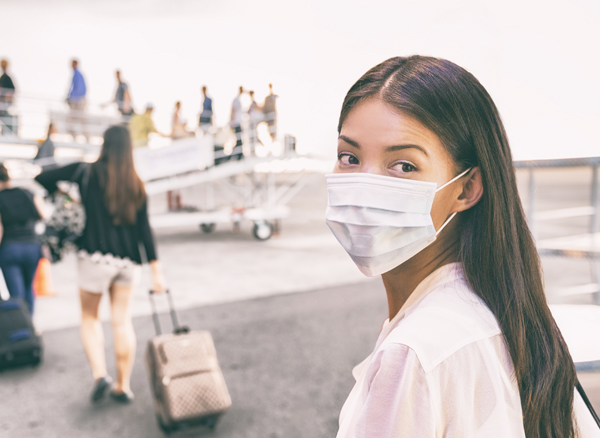

The future airport experience: A return to business travel
As the travel industry shifts from emergency response to preparation for re-entry, we take a look at what the airport environment may look like in a COVID-19 recovery era, and what business travellers can expect as a result of the future airport experience.
Corporate Travel Management (CTM) recently conducted a global customer survey to understand the key issues and concerns facing businesses and their travellers as they prepare for a return to business travel.
A recurring theme across our survey findings was the future airport experience – from terminal cleanliness to security and health screening, social distancing to lounge access and many more questions in between.
In this blog, we summarise some key recommendations from peak global travel and airport associations to support the safety, efficiency and confidence of travellers in the airport environment as we prepare for the ‘new normal’ in business travel.
Restarting aviation
The International Air Transport Association (IATA) has outlined three key requirements and stakeholder groups to successfully restart aviation:
- Governments: to assume new responsibilities in relation to assessing and identifying traveller health risks;
- Airports and airlines: in creating and adapting processes and procedures to minimise contagion risk;
- Passengers: to be empowered to take greater control of their journey, including the assessment of their own health risk prior to travel.
Airport terminal access
Some airports are implementing restricted airport access to workers, travellers and accompanying persons (for example those assisting passengers with disabilities, reduced mobility or unaccompanied minors). General guidance is: do not travel to the airport unless you are travelling.

Health screening
Health screening is a major talking point for governments, airports and travel operators and can take a variety of forms, from pre-departure traveller declarations to on-site airport screening.
IATA recommends that health screening measures should be introduced as ‘upstream’ as possible, enabling travellers to arrive at the airport ‘ready to travel’ and therefore minimising risk of contagion at airports. Many airlines have introduced pre-departure online health screening declarations for travellers to complete prior to arrival at the airport.
Similarly, IATA recommends that any measures that need to be applied during the travel process should be applied prior to departure rather than on arrival. This includes temperature screening at terminal building entry points, conducted by professionally trained staff, to determine if passengers are fit to fly. London Heathrow Airport (LHR) is an example of a major international airport trialling large-scale temperature checks by carrying out testing at departure gates for passengers departing to destinations where this is a requirement. Incheon International Airport (ICN) is also conducting pre-boarding temperature checks for all passengers departing from the airport.
Additionally, IATA notes “When proven and available at scale, testing for COVID-19 or immunity passports could also be included as temporary biosecurity measures.”
In April, Emirates became the first airline to conduct on-site rapid COVID-19 tests, implementing a quick blood test for international travellers flying from Dubai to Tunisia. Results were available within 10 minutes of the test. “We are working on plans to scale up testing capabilities in the future and extend it to other flights, this will enable us to conduct on-site tests and provide immediate confirmation for Emirates passengers travelling to countries that require COVID-19 test certificates”, said Adel Al Redha, Emirates Chief Operating Officer.
Check-in
In general, most airports are not currently advising travellers to arrive earlier than normal for their departing flight, however CTM recommends travellers verify check-in times prior to travel in case this advice changes with growth in passenger movements.
IATA recommends that passengers should complete as much of the check-in process as possible before arriving at the airport to minimise time spent at the airport. This includes mobile or home printed boarding passes and bag tags, and personal data captured online where possible.
Baggage drop-off
Passengers can expect to see an increased use of self-service baggage solutions (such as baggage drop), where available, to minimise physical interactions between passengers and airport staff.
Airport security & screening
Passengers may experience an increase in touchless technology and biometrics during security and screening. This may include electronic declarations (eg mobile and QR codes) and contactless processes such as ePassport chip reading and facial recognition to limit hand-to-hand contact.
Physical distancing
Physical distancing throughout the airport’s facilities will need to be implemented in line with local rules and regulations and should be designed to maximise passenger flow through the terminal – from check-in, immigration, security, departure lounge to boarding. Where possible, airports may seek to avoid side-by-side gating for aircraft boarding to allow guests more distance within the boarding lounge.
Boarding
Travellers can expect to see more self-serve scanning stations during the boarding process to minimise physical handling of boarding passes. Additionally, many airlines are transitioning to a back-to-front boarding process based on assigned seating rows to better manage the flow of passenger traffic from airport to aircraft.
Cleaning
Airports are implementing new and innovative cleaning measures to minimise risk of contagion, increase efficiency and improve traveller comfort and confidence in the airport environment. Pittsburgh International Airport (PIA) is amongst those trialling the use of autonomous robots for cleaning purposes, while Hong Kong International Airport has rolled out intelligent sterilisation robots to disinfect public areas, in the meantime it is also trialling a full-body disinfection channel facility to sanitise human bodies and clothing in 40 seconds.
IATA’s guidance states “In observance of local rules and regulations, airlines, airports and governments need to cooperate to ensure that equipment and infrastructures are sanitised and hydroalcoholic gel is easily made available. The frequency of the sanitising should be established, communicated, and appropriate resources need to be put in place to enforce it. This applies to such items as carts, trolleys, e-gates, self-service kiosks, fingerprint readers, wheelchairs, trays, used medical masks disposal container, on-board equipment, etc.”
Baggage claim and customs
Speed and efficiency in the baggage claim process is a key area of focus to support social distancing and limit physical interaction. Where possible, airports may make use of more baggage carousels per flight arrival to allow for greater physical distancing.
It will also be critical that the customs clearance process is as speedy as possible whilst maintaining the highest levels of security.
According to Airports Council International (ACI), “Airports need to accelerate the digitalisation for all the touchpoints of the customer journey. Improving the movement of travellers through the border will reduce passenger stress, for instance. Technologies such as e-gates, biometrics, and CT scanners might help in this process too.”
In summary…
This is a fast-changing landscape where guidance, solutions and levels of adoption may change regularly and will vary across regions and suppliers.
There are still many unknowns regarding the post COVID-19 travel environment. Governments, travel industry bodies, suppliers and travel agencies continue to work hand-in-hand to design and deliver effective solutions that will support safety, peace of mind and value for businesses and their travellers to support economic recovery whilst minimising risk.
CTM invites customers to seek specific insights and updates relating to their preferred travel suppliers and travel needs via Corporate Sales Team.
Published 11 May 2020
The information in this article is sourced from third parties. CTM does not take responsibility for its accuracy or currency. CTM recommends travellers seek independent information prior to travel.
Eager to find out more about the future airport experience.
Contact CTM’s team of travel experts to find out more.


